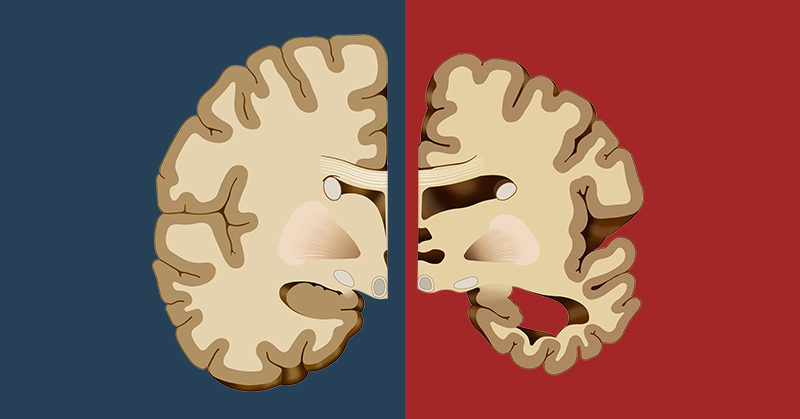Dementia is a progressive condition that damages and eventually kills brain cells. In the next ten years, experts project that about 82 million people worldwide will have dementia [1]. While there is still no cure for the condition, knowing the early warning signs of dementia can help you or your loved one get the support they need.
What is Dementia?
Dementia is not one specific disease. Instead, it is a collection of symptoms resulting from various brain disorders. While a certain amount of memory loss is normal as you age, Alzheimer’s and other dementias are different [2].
Dementia is memory loss that is severe to the point that it is affecting your everyday life. People with dementia have difficulty sticking to their normal routines, learning new things, and completing tasks they’re familiar with [3].
While most people who develop dementia are over the age of 65, it is not exclusively an “old person’s” condition. A small portion of people in their forties and fifties can also develop the condition. When this happens, experts refer to it as “young onset dementia” [2].
As the prevalence of dementia continues to increase worldwide, it is very important to know the early warning signs of the condition. This will help to diagnose it earlier and begin creating a proper care plan as it progresses.
Read: Diets Low in This Antioxidant Diet May Contribute to Memory Decline
12 Early Warning Signs of Dementia
Particularly in its early stages, warning signs of dementia can be very subtle and difficult to detect. If you notice any of the following behaviors in yourself or a loved one, talk to your doctor about being assessed for Dementia.
1. Short-Term Memory Loss

Of course, forgetfulness is an affliction that happens to everyone occasionally, but for someone exhibiting early warning signs of dementia, short-term memory loss will be more pronounced or perhaps more frequent.
For example, someone in the early stages of dementia may leave items in odd places, such as leaving the keys in the sugar bowl or putting their wallet in the kitchen drawer [4]. In addition, someone with early dementia may be able to recall events from their past, but can’t remember what they ate for breakfast.
A 2009 report found that patients with Alzheimer’s disease also have difficulty establishing new long-term memories. The researchers explained that this is because the pathological changes in Alzheimer’s occur mainly in the brain’s hippocampal region. This brain area plays a major role in learning and memory [5].
2. Difficulty with Familiar Tasks

People with dementia often have difficulty performing regular daily tasks. Typically this begins with more complex tasks such as driving to a familiar place, preparing a meal, or playing their favorite board game. Gradually, however, simpler tasks may become increasingly difficult.
Additionally, someone with dementia may also begin to have trouble learning new tasks or following new routines [6].
3. Language Problems

One of the early warning signs of dementia is when someone struggles with vocabulary. When this occurs, you may notice they forget simple words or substitute words, making it difficult to understand what they’re saying. For example, they may substitute “hand clock” for “watch.”
Someone with dementia may also use general pronouns instead of names, mispronounce words, or have trouble understanding verbal and written communication [6].
Read: 6 Diseases Your Lack of Sleep Could Be Causing
4. Mood Changes

Someone with dementia may experience frequent and drastic mood changes. It is very common for people with the condition to experience anxiety and depression, particularly in the early stages [7].
It is often difficult to notice mood changes within yourself; however, if you find that someone close to you is exhibiting varied mood swings, it could be an early warning sign of dementia.
5. Disorientation

Disorientation in time and space is a common sign of dementia. This means that the individual will have trouble knowing what day of the week it is, or they may get lost in a place that is familiar to them.
Disorientation poses a danger to the individual and limits their ability to do daily activities outside the home. For this reason, it is important to provide assistance to these people so they can live comfortably and safely [8].
6. Difficulty Following a Conversation

People with dementia may forget the meaning of some words, which makes it difficult to follow a storyline or keep up with a conversation. They may struggle, particularly in the midst of a group conversation, and may have difficulty keeping a conversation going [9].
Additionally, if someone stops being able to understand sarcasm and lies, this may be an early warning sign of dementia [10].
7. Being Repetitive

Memory loss and behavioral changes associated with dementia may also cause someone to repeat themselves frequently. In fact, you may notice that they repeat the same things several times within one conversation. They may also repeat daily tasks, like shaving, or collect things obsessively [11].
8. Loss of Initiative

Apathy, listlessness, and loss of initiative are common signs of dementia. This could include losing interest in hobbies or activities they normally love or seeming “emotionally flat.” According to experts, apathy affects up to 76 percent of individuals with Alzheimer’s [12].
Read: Massive Study Shows Vitamin D Supplements May Help Fend Off Dementia
9. Problems with Abstract Thinking

In the early stages of dementia, someone may have trouble performing tasks that involve abstract thinking, such as using a calculator or balancing a checkbook. As it progresses, however, they may have trouble with simpler “abstract” ideas, such as the meaning of numbers and how to use them [13].
10. Decreased or Poor Judgement

People with dementia may experience lapses in judgment or lose some of their decision-making skills. For example, they may pay less attention to personal grooming, ignore an obvious health issue, or choose to wear a heavy coat on a hot day [6].
11. Withdrawal from Social Activities

Because someone with dementia has difficulty conversing, they may begin to withdraw from social engagements. This could include workplace activities, family functions, and invitations from friends [14].
12. Personality Changes

While people tend to experience personality changes over time, you may notice that in someone with dementia, these changes seem more sudden or drastic. Changes may include confusion, suspiciousness, or shyness, among others. Studies have shown that these changes are some of the earliest warning signs of dementia and often precede a clinical diagnosis [15].
When to Get Help
Dementia can be difficult to spot because we often associate many of the early warning signs with normal age-related changes. Of course, forgetfulness and memory problems do not always mean you have dementia, particularly as you age. That being said, if you or a loved one are experiencing several of these symptoms and they don’t seem to approve, you should talk to your health care practitioner.
They can refer you to a neurologist, who will perform a series of tests to determine if you do, in fact, have dementia. If this is the case, they can work with you to create an action plan to help you and your family as the condition progresses.
While there is still no cure for dementia, scientists constantly learn more about the condition. One day we will hopefully have better treatment for dementia, but for now, knowing the early warning signs can help you diagnose it earlier and thus help you to create a better care plan for you or your loved one.
Keep Reading: Vitamin B12 Deficiency and Dementia Symptoms: What You Should Know
Sources
- “Dementia.” WHO.
- “What is dementia?” Alzheimer
- “The differences between normal aging and dementia.” Alzheimer
- “Memory loss: When to seek help.” Mayo Clinic
- “Short- and long-term memory in patients with presenile dementia (Alzheimer’s disease).” Cambridge.
- “Evaluation of Suspected Dementia.” AAFP. Nathan Falk, MD, Ariel Cole, MD, And T. Jason Meredith, MD.
- Scales and Measure
- “Spatial Disorientation in Persons With Early Senile Dementia of the Alzheimer Type.” AJOT. Lili Liu, et al.
- “Symptoms of communication breakdown in dementia: carers’ perceptions.” T and F Online. Jennie A Powell.
- “Inability to Detect Sarcasm May Herald Dementia.” Live Science. Stephanie Pappas.
- NCBI
- “Depression and apathy in dementia: Same syndrome or different constructs? A critical review.” Science Direct. P. Tagariello, et al.
- “Cognitive deficits of mild dementia:A comparison between dementia of the Alzheimer’s type and vascular dementia.” Wiley. Osamu Matsuda PhD. et al.
- “Behavioral Alterations and Vascular Dementia.” The Neurologist. Moretti, Rita MD, et al.
- “Personality Change Precedes Clinical Diagnosis of Dementia of the Alzheimer Type.” Oxford Academic.

